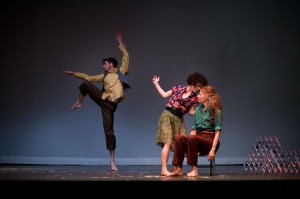MFA Monday: Why I Despise the Word “Passion”
 or Establishing our Own Value
or Establishing our Own Value
by Matthew Cumbie
How much is my career worth? How much is my art work worth? When is it ok for me to ask for expect compensation for my services?
These are questions that I struggle with almost daily. And I’m willing to wager my small salary that many of you struggle with these same, or similar, questions at various points in your artistic career. Why is that? What is the cause for this dilemma? And when did it become O.K. to divert our attention from addressing these questions by saying, “Oh, you do it because you love it”?
Before I go any further, I want to say that I feel very, very fortunate for my current situation and for those experiences and situations that have led me to where I am. I realize that few opportunities to do what I do exist, and to get paid to do those things is sometimes unreal. And I love what I do. But I don’t ever recall this to be a reason that we not pay someone for their work. Returning to our questions above, the reasons could by many: too little funding, it’s a great experience, I don’t have a budget, and many others that we could compile over a few glasses of wine I’m sure. And while these all might be true and very valid, I would like to throw one (or two, depending on how you look at it) more in the mix that I find often unacknowledged: you and me.
That’s right. We are sometimes the cause of our own problems, especially in this situation. I say this because we, as performers and makers and teachers, perpetuate this problem of not paying artists when we participate in this cycle. We do it because we have no other option. We do it because we want to be involved in this love affair at whatever the cost. We do it because we know that if we don’t, someone else will…and for free. We do it because we want that, that right there, on our CV. You know, so when we decide that we’re marketable or valuable we’ll have more artistic weight to throw around. And that’s the magic button- we decide.
This is where the water gets murky, though.
When do we put our collective foot down and say enough is enough, and that I have bills to pay too? I recently had a discussion with a good friend from my undergraduate years regarding this issue of paying dancers. Following school, we pursued very different paths; both still involved in the field but in different professional capacities. I say this only to illustrate that we are coming from different vantage points. Anyways, our debate came down to a discussion about experience and caused me to reflect on my own participation in this unspoken poor person’s treatise. Prior to and throughout graduate school, I viewed getting paid to dance as an added bonus. I was there for the experience, and felt quite uncomfortable addressing the compensation side of things. Almost afraid to bring up the subject, really. As if some omniscient fairy would one day fly down, take all that money (which was not a lot) that I had earned from various dance gigs, and bop me on the nose for being silly enough to think that I could make a living doing something that I enjoyed so much. Looking back, I’m not sure that I thought much about the fact that I had to work a number of other jobs to carve out a sustainable life; some of that might have had to do with my age and some with the place in which I was living (a much, much lower cost of living than where I’ve been post graduate school).
Immediately following graduate school, I moved to New York City for the second time (the first was brief and I was young- another story for another time). Surely, I thought, here would be a progressive community of like minded professionals who all valued dance the same as I and wanted to acknowledge and celebrate our abilities as professional artists by paying each other accordingly. Wrong. Instead I found myself having to work a number of projects simultaneously, as well as work a few other odd jobs to pay my rent…and loans. What ended up happening in this time period, interestingly, was probably more valuable than actually being paid enough to make a living; I finally started to look at how I was allocating my time and my work and began to curate what opportunities interested me the most, looking at what kinds of experiences I would be invested in and what kind of investment this artist was making in me. All of the artists I found myself working with at some point verbally acknowledged that the amount we were receiving was nowhere near what it should have been or what they would like it to be, and I appreciated the dialogue and knowing that they were making efforts to help us create a sustainable life. I appreciated the external validation that I was valuable in the same way that I saw myself as valuable.
More recently, my friend and fellow Dance Exchange artist Sarah Levitt and I were attending an arts conference about sustaining and growing the arts. When discussing how our various organizations might do more for less, it was suggested that we all hire interns because, “they don’t need to be paid.” Both Sarah and I, having had many conversations privately about paying artists/people what they are worth, were aghast. While I realize that internships provide excellent opportunities, and many of these opportunities are unpaid, the manner in which this comment was so brazenly delivered had me seriously questioning at what point do we deem someone valuable enough? Is there a transition point when we go from being invaluable to valuable? Does it hurt? I mean, interns are people too. Somewhat related, Sarah and I have talked about a ‘new model’ for the arts, something we’ve both heard from various sources. As a working artist, the proposed new way to do your work is to get a full time job doing something else and to do your art on the side. Why? What does that say about how we value our work then? Not that I think it’s a bad model, but I believe that we all should be able to create our own models for working and sustaining ourselves. If I want to make a living by creating art, then I should be able to do that and know that it’s my responsibility to be able to communicate why this art is valuable to a larger audience.
The whole point of this blog is not to answer any questions really. It’s to ask more questions. Why is the system like this? What are we educating and telling the future dance makers and artists out there? That there are prescribed ways of working? Of valuing? Of navigating this diverse and rich field? I hope not. If we’re ever going to challenge our old ways of doing and thinking, we need to start talking about it. I think that making the decision to be valuable is up to each individual, and to weight that against whatever the experience might be and whatever the compensation might (or might not) be. You are of value, rich with history and talent and ideas. I’d like to think that through this conversation and acknowledgement of who we are and how what we do is worth something, that perhaps we can start to change the system. Perhaps we can up the ante and help create, find, or inspire those funding sources. Maybe we can encourage more artists to think about how they’re working with others and compensating them for their time. Hopefully we can challenge this popular, romantic belief that we are only in this because we love it, that our passion for dancing is what gets us through. Hopefully.
And that is why I despise the word ‘passion.’

Matthew Cumbie is a professional dance artist based in Washington, DC, and is currently a Resident Artist and the Education Coordinator for the Dance Exchange. As a company member with the Dance Exchange, he works with communities across the United States and abroad in collaborative art-making and creative research as a means to further develop our understanding of our selves and community in relation to the environment around us. He has also been a company member with Keith Thompson/danceTactics performance group, and has performed with Mark Dendy, the Von Howard Project, Sarah Gamblin, Jordan Fuchs, jhon stronks, Paloma McGregor, and Jill Sigman/thinkdance. His own work has been shown in New York, Texas, New Mexico, Louisiana, and at Harvard University. He has taught at Dance New Amsterdam, Texas Woman’s University, and Queensborough Community College. He holds an M.F.A. in dance from Texas Woman’s University.
Uncategorized
